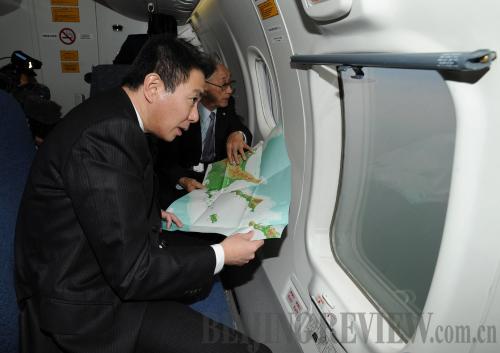|
 |
|
SURVEYING DISPUTED TERRITORY: Japanese Foreign Minister Seiji Maehara in a Coast Guard airplane inspects the four Russian-held islands, over which Japan claims sovereignty, on December 4, 2010 (XINHUA) |

Russia and Japan have been at odds over the sovereignty of the Southern Kuril Islands, known as the Northern Territories in Japan, for more than five decades. Conflicts have sharpened since 2009, especially since November 1, 2010, when Russian President Dmitry Medvedev visited one of the four islands. In February this year, Japanese Minister of Foreign Affairs Seiji Maehara visited Russia, drawing even more attention to the problem. However, this territorial dispute will likely remain unsettled for a long time.
History
The history of the Russia-Japan territorial dispute can be traced back to the 19th century. In 1855, Russia and Japan signed a treaty in which the two countries agreed to share the entire Kuril Islands. Based on the treaty, Japan gained sovereignty over the Southern Kuril Islands—four islands that lie off the northernmost Japanese island of Hokkaido.
In February 1945, the Soviet Union, the United States and Britain signed the Yalta Agreement. According to the agreement, the Kuril Islands would be handed over to the Soviet Union after World War II as a reward for its dispatching troops to fight the Japanese. Six months later, the Soviet Army occupied the Southern Kuril Islands after Japan's defeat. In February 1946, the Soviet Union claimed sovereignty over the islands as part of the Kuril Islands—a claim Japan refused to accept.
A decade later in 1956, the Soviet Union and Japan held negotiations in Moscow. In a joint statement, the Soviet Union said it was ready to return to Japan two of the four islands after the two sides signed a peace treaty. However, Japan insisted on gaining sovereignty of all four islands before such a treaty was signed. As a result, this problem was shelved.
Russia believes it was legitimate for the Soviet Union, a victor of World War II, to take over the Southern Kuril Islands from Japan. Therefore, Moscow has persisted in its view that Japan's claim of sovereignty over the islands is a total denial of the Yalta Agreement. Russia has pointed out that such a denial would influence not only the Russia-Japan relationship, but also the current international order, including borders between Russia and many of its European neighbors.
During Vladimir Putin's presidency, he once said Russia was ready to negotiate over the disputed territories and sign a peace treaty with Japan based on the 1956 statement. However, Japan believed Russia "illegally occupied" the four islands when Japan lost the war. It said it would not sign a peace treaty with Russia until these islands were returned. Since neither of the two sides wants to compromise, they have yet to sign a peace treaty to cement bilateral ties.
Fresh tensions
In September 2006, then Japanese Foreign Minister Taro Aso proposed a new solution. He suggested that Japan get the three smaller islands located near Japan and Russia get the biggest one located near Russia.
In February 2009, Aso, who was then Japan's prime minister, met with Medvedev. There were no reports about whether he raised his proposal at the meeting. But both agreed to accelerate negotiations on the disputed territories.
Four months later, however, the lower house of the Japanese parliament passed an amendment to a law concerning Japan's Northern Territories. It was the first legal document to describe the four disputed islands as Japan's "inherent territory." The amendment was approved by the upper house within one month and took effect in April 2010.
| 